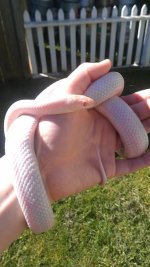Hey guys,
We took Daisy, our 3 1/2 year old fancy opal, to a vet today because we were concerned about a possible respiratory infection. She was making some "squeaking" sounds during a recent handling. They were sporadic though--about 3-4 times during a 20 minute handling, not with every breath. She also had her mouth a little ajar last night. Not completely open, just doing a little Elvis-like sneer. The vet found no problems in her mouth and no wheezing when he listened to her breathing with the stethoscope. He gave her an antibiotic shot and said we could complete the 5 shot series as a precaution. The only problem is, the vet is 30 minute drive each way and driving out there every other day for the next ten days is a bit of a challenge. Would you fellow snake lovers do that if there was no confirmed respiratory infection? General notes--Daisy was a rescue snake that we picked up just over one year ago. She is kept in a nicely set up 40 gallon breeder that is 90 at its hottest and about 70 at its coolest. She uses hides on both sides equally. Water is changed frequently, she is handled often, eats well and sheds well. Other than being initially skittish due to the sub-par conditions she lived in for her first 2 plus years, she seems like a happy, healthy snake. We will absolutely make the drive to the vet if it is necessary, but I wanted your impressions. Any thoughts? Thank you in advance for the help!
We took Daisy, our 3 1/2 year old fancy opal, to a vet today because we were concerned about a possible respiratory infection. She was making some "squeaking" sounds during a recent handling. They were sporadic though--about 3-4 times during a 20 minute handling, not with every breath. She also had her mouth a little ajar last night. Not completely open, just doing a little Elvis-like sneer. The vet found no problems in her mouth and no wheezing when he listened to her breathing with the stethoscope. He gave her an antibiotic shot and said we could complete the 5 shot series as a precaution. The only problem is, the vet is 30 minute drive each way and driving out there every other day for the next ten days is a bit of a challenge. Would you fellow snake lovers do that if there was no confirmed respiratory infection? General notes--Daisy was a rescue snake that we picked up just over one year ago. She is kept in a nicely set up 40 gallon breeder that is 90 at its hottest and about 70 at its coolest. She uses hides on both sides equally. Water is changed frequently, she is handled often, eats well and sheds well. Other than being initially skittish due to the sub-par conditions she lived in for her first 2 plus years, she seems like a happy, healthy snake. We will absolutely make the drive to the vet if it is necessary, but I wanted your impressions. Any thoughts? Thank you in advance for the help!

